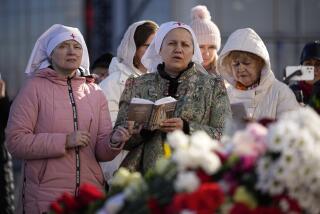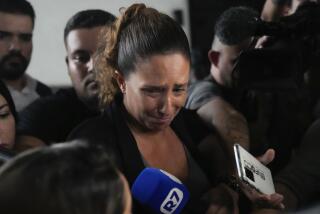St. Petersburg Swirls With Dark Currents
- Share via
ST. PETERSBURG, Russia — Westerners know St. Petersburg for its opulent palaces, graceful canals and renowned art museums, a city lauded as Russia’s most cultured and progressive, a “Venice of the North.”
However, as any guidebook will tell you, the city was built on a swamp, so darker, murkier currents flow not far below the surface.
One of those is the city’s history of political assassinations. It was on the eastern end of the Griboyedov Canal that revolutionaries killed reformist Czar Alexander II in 1881, destroying what many historians consider Russia’s best chance at becoming a Western-style constitutional monarchy. It was about two miles farther east along the Neva River that an assassin murdered Leningrad party boss Sergei M. Kirov in 1934, triggering a wave of purges that killed millions and became known as the Great Terror.
And it was along a curve in the middle of the canal that obstinate liberal Galina V. Starovoitova was gunned down last month, an event that many fear could set off a new round of repression and political violence.
“The political atmosphere here is unhealthy, dangerous,” said poet Viktor Krivulin, one of Starovoitova’s associates. “Her murder and all the rest are a result of it.”
Even in literature the city seethes with political undercurrents. Many of Russia’s greatest writers--Alexander Pushkin, Nikolai Gogol, Fyodor Dostoevsky, Andrei Bely--have depicted St. Petersburg as a place where ideas and ideologies swarm as thick as the fog that rolls in off the Baltic Sea--and violence rises and ebbs like the tide in its tangle of canals.
In “Crime and Punishment,” Dostoevsky’s anti-hero, Raskolnikov, kills an old woman to prove a political theory: that he is a superior man unbound by conventional morality. The building where the fictional murder took place is across the Griboyedov Canal from Starovoitova’s house.
It may seem strange that such a liberal, progressive city has inspired so much violence. Yet it is precisely St. Petersburg’s penchant for progressive causes that has made it a magnet for political murder.
Peter the Great founded the city in 1703 on the shores of the Baltic so Russia could have greater access to Western Europe. St. Petersburg not only became his capital but the portal through which European thought reached--and often clashed with--the rest of Russia.
Part of the problem is that Peter was also a power-loving autocrat who built a rigid hierarchy of aristocrats and bureaucrats to serve his empire. In fact, he embodied the duality that came to define his city: Western ideas coexisting uneasily with Eastern dictatorship.
St. Petersburg’s current political troubles also fit this pattern. In January, liberal-minded legislators defied the city’s autocratic governor and passed a new city charter reducing his powers and changing themselves from part-time rubber-stampers to full-time professional lawmakers. Starovoitova openly supported the liberals and formed a coalition to back them in legislative elections scheduled for Sunday.
What has happened since could be a story line straight out of Gogol or Dostoevsky. Mysterious “doubles” who have the same names as declared candidates have appeared on ballots. Ditto for some political parties. Half a dozen political aides have turned up dead, and gunshots have been fired in the night into candidates’ homes.
And on the night of Nov. 20, after being followed and wiretapped for months, Starovoitova was gunned down in the stairwell of her home, just two doors away from the headquarters of the OMON, an elite police force.
Starovoitova’s allies say her slaying is yet another attempt by Russia’s baser forces to frighten and oppress Western-inspired liberals.
Her allies accuse the governor of being in cahoots with the mafia or Moscow-based political figures who want to stamp out all notions of democracy. These forces, they say, are testing the levers of political control that they hope to use to regain power in the nation’s 2000 presidential election.
That may or may not be true, and the outcome of Sunday’s elections may give some indication.
However, those with a taste for paranoia had ample evidence the day after Starovoitova’s funeral. All over town, the face of the governor appeared on campaign posters, even though he is not up for election.
In St. Petersburg’s highly charged atmosphere, the message on the posters was either simple or sinister: “Go Vote,” it read.
More to Read
Sign up for Essential California
The most important California stories and recommendations in your inbox every morning.
You may occasionally receive promotional content from the Los Angeles Times.













